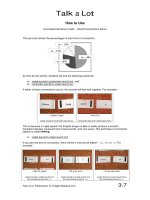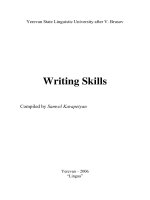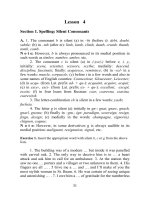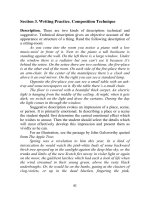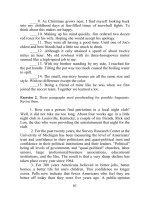Tài liệu Developing writting skills 2 part 5 doc
Bạn đang xem bản rút gọn của tài liệu. Xem và tải ngay bản đầy đủ của tài liệu tại đây (109.94 KB, 10 trang )
40
animals perhaps and always singing, lay England which was London
and the country called the Front, from which many of our neighbors
never came back. It was a country to which only young men traveled.
5. At the beginning, the only “front” I knew was the little lobby
before our front door. I could not understand how so many people
never returned from there, but later I grew to know more, though still
without understanding, and carried a wooden rifle in the park and
shot down the invisible unknown enemy like a flock of wild birds.
And the park itself was a world within a world of the sea town. Quite
near where I lived, so near that on summer evenings I could listen in
my bed to the voices of older children playing ball on the sloping
paper-littered bank, the park was full of terrors and treasures. Though
it was only a little park, it held within its borders of old tall trees,
notched with our names and shabby from our climbing, as many
secret places, caverns and forests, prairies and deserts, as a country
somewhere at the end of the sea.
6. And though we would explore it one day, armed and desperate,
from end to end, from the robbers’ den to the pirates’ cabin, the
highwayman’s inn to the cattle ranch, or the hidden room in the
undergrowth, where we held beetle races, and lit the wood fires and
roasted potatoes and talked about Africa, and the makes of motor
cars, yet still the next day, it remained as unexplored as the Poles ─a
country just born and always changing.
7. There were many secret societies but you could belong to only
one; and in blood or red ink, and a rusty pocketknife, you signed
your name at the foot of a terrible document, swore death to all the
other societies, crossed your heart that you would divulge no secret
and that if you did, you would consent to torture by slow fire, and
undertook to carry out by yourself a feat of either daring or
endurance. You could take your choice: would you climb to the top
of the tallest and most dangerous tree, and from there hurl stones and
insults at grown-up passersby, especially postmen, or any other men
in uniform? Or would you ring every doorbell in the terrace, not
forgetting the doorbell of the man with the red face who kept dogs
and ran fast? Or would you swim in the reservoir, which was
forbidden and had angry swans, or would you eat a whole old jam jar
full of mud?
41
8. There were many more alternatives. I chose one of endurance
and for half an hour, it may have been longer or shorter, held up off
the ground a very heavy broken pram we had found in a bush. I
thought my back would break and the half hour felt like a day, but I
preferred it to braving the red face and the dogs, or to swallowing
tadpoles.
9. We knew every inhabitant of the park, every regular visitor,
every nursemaid, every gardener, every old man. We knew the hour
when the alarming retired policeman came in to look at the dahlias
and the hour when the old lady arrived in the Bath chair with six
Pekinese, and a pale girl to read aloud to her. I think she read the
newspaper, but we always said she read the Wizard. The face of the
old man who sat summer and winter on the bench looking over the
reservoir, I can see clearly now and I wrote a poem long long after
I’d left the park and the sea town called “The Hunchback in the
Park.”
10. And that park grew up with me; that small world widened as I
learned its secrets and boundaries, as I discovered new refuges in
ambushes in its woods and jungles; hidden homes and lairs for the
multitudes of imagination…
11. Never was there such a town as ours, I thought, as we fought on
the sandhills with rough boys or dared each to climb up the
scaffolding of halfbuilt houses. Never was there such a town, I
thought, for the smell of fish and chips on Saturday evenings; for the
Saturday afternoon cinema matinees where we shouted and hissed
our threepences away; for the crowds in the streets with leeks in their
hats on international nights; for the park, the inexhaustible and
mysterious, bushy red-Indian hiding park where the hunchback sat
alone and the groves were blue with sailors.
12. The memories of childhood have no order, and so I remember
that never was there such a dame school
1
as ours, so firm and
smelling of galoshes, with the sweet and fumbled music of the piano
lessons drifting down from upstairs to the lonely schoolroom, where
only the sometimes tearful wicked sat over undone sums, or to repeat
a little crime—the pulling of a girl’s hair during geography, the sly
shin kick under the table during English literature. Behind the school
1
dame school = grammar school for young children
42
was a narrow lane where only the oldest and boldest threw pebbles at
windows, scuffled and boasted, fibbed about their relations—
“My father’s got a chauffeur.”
“What’s he want a chauffeur for? He hasn’t got a car.”
“My father’s the richest man in the town.”
“My father’s the richest man in Wales.”
“My father owns the world.”
And swapped gob-stoppers for slings, old knives for marbles, kite
strings for foreign stamps.
13. The lane was always the place to tell your secrets; if you did not
have any, you invented them. Occasionally now I dream that I am
turning out of school into the lane of confidences when I say to the
boys of my class, “At last, I have a real secret.”
“What is it—what is it?”
“I can fly.”
14. And when they do not believe me, I flap my arms and slowly
leave the ground only a few inches at first, then gaining air until I fly
waving my cap level with the upper windows of the school, peering
in until the mistress at the piano screams and the metronome falls to
the ground and stops, and there is no more time.
15. And I fly over the trees and chimneys of my town, over the
dockyards skimming the masts and funnels, over Inkerman Street,
Sebastopol Street, and the street where all the women wear men’s
caps, over the trees of the everlasting park, where a brass band
shakes the leaves and sends them showering down onto the nurses
and the children, the cripplers and the idlers, the gardeners, and the
shouting boys: over the yellow seashore, and the stone-chasing dogs,
and the old men, and the singing sea.
The memories of childhood have no order, and no end.
43
Explain what is meant by:
1. … watched the dock-bound ships or the shops steaming
away into wonder and India, magic and China, countries
bright with oranges and loud with lions.
2. … on Saturday summer afternoons listened to the brass
band, or hung about on the fringes of the crowd to hear the
fierce religious speakers who shouted at the sea, as though it
were wicked and wrong to roll in and out like that, white-
horsed and full of fishes.
3. …lay England which was London and the country called the
Front, from which many of our neighbors never came back.
It was a country to which only young men traveled.
4. And the park itself was a world within a world of the sea
town.
5. Though it was only a little park, it held within its borders of
old tall trees, notched with our names and shabby from our
climbing, as many secret places, caverns and forests, prairies
and deserts, as a country somewhere at the end of the sea.
6. …undertook to carry out by yourself a feat of either daring
or endurance.
7. And that park grew up with me; that small world widened as
I learned its secrets and boundaries, as I discovered new
refuges in ambushes in its woods and jungles; hidden homes
and lairs for the multitudes of imagination…
8. …lonely schoolroom, where only the sometimes tearful
wicked sat over undone sums, or to repeat a little crime—the
pulling of a girl’s hair during geography, the sly shin kick
under the table during English literature.
QUESTIONS FOR STUDY AND DISCUSSION
1. Does Dylan Thomas succeed in giving a full picture of his
home town in the opening paragraph (2)? Cite some of the
colorful visual images the author creates. Are they the
44
creation of a grown-up’s or a boy’s imagination? Account
for your answer.
2. Comment on the author’s claiming his town as an ugly and
lovely one.
3. What do you learn about Wales in paragraphs 3 and 4?
What does the author imply by “the country called the
Front”?
4. How are paragraphs 4 and 5 connected?
5. How does a child’s world perception expand? Comment on
paragraph 5.
6. In what sense was the neighborhood park a place of mystery
and adventure for Thomas and his friends? How effective is
the author in conveying the image of the park? How does he
achieve it?
7. What was the role of secret societies in the lives of the
children? What kind of feat did they have to carry out to
become a member of a secret society? Does the author
provide enough concrete details for the readers to visualize
their deeds?
Did your neighborhood play the same role in your
childhood? Do you attach any importance to imagination in
one’s childhood?
8. What does Thomas mean by “that park grew up with me…”?
9. What reminiscences of his school years does Thomas include
in his essay?
10. Comment on the last two paragraphs. How are they
connected with the preceding part? How effective is
Thomas’s conclusion in tying the paper together?
11. Comment on the composition of the essay. “The memories
of childhood have no order,” Thomas says. Is there any
discernible ordering or grouping apparent in the way he has
narrated these remembrances of childhood? Into how many
parts would you divide the essay? Explain.
12. Speak on the tone of the essay.

